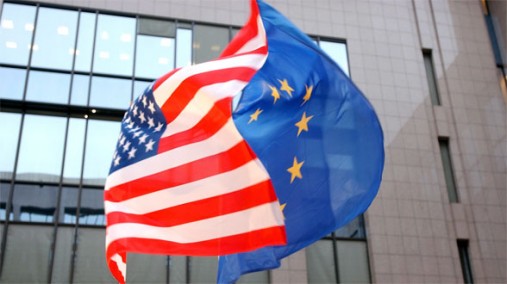With both the United States and Europe mired in economic stagnation, removing the remaining barriers to trade—both tariffs and divergent regulations—is critical to maintaining the leadership position the West has grown accustomed to. President Obama made clear in his State of the Union address that pursuing a comprehensive agreement with the European Union will be a key economic priority for the administration in the year to come. Calling for negotiations to begin immediately, the president emphasized that “trade that is free and fair across the Atlantic supports millions of good-paying American jobs.” This is especially the case with an EU-US accord, and not surprisingly, many European leaders—both in Brussels and national capitals—have been so outspoken in their support for this deal as well.
In a time of limited government resources and slow growth in the aftermath of the financial and eurozone crises, strengthening trade and investment ties across the Atlantic represents the kind of “free stimulus” that both the US and EU desperately need. With American and European policymakers understandably focused on job creation and economic growth, this year marks an historic opportunity to make the kind of significant process that has eluded both sides in the past. Political and electoral realities play a role too. There is significant desire to conclude negotiations before the election campaigns for a new Congress and European Commission kicks off in 2014. In other words, the time for action is now.
Attendees at a recent Atlantic Council dinner with a group of leading policymakers and senior business executives insisted that Europe’s leaders have the political will—and popular support—to tackle the major issues and solve the significant challenges that have thwarted negotiations in years past. The ongoing economic malaise and unemployment crisis have provided significant motivation to act.
American policymakers were slightly more reserved and guarded about the prospects of success. They noted that previous disputes over the use of the precautionary principle in setting standards and developing regulations, to give but one major example, continue to divide the US and Europe. However, the United States has a jobs and growth problem, as well, and the chance to develop what would be the world’s largest market—with the ability to set high regulatory, environmental, and product safety standards for the rest of the world to aspire to—is a goal with significant economic benefits. At the time of the dinner, the major question was whether the United States would share Europe’s interests in undertaking the hard work of securing a trade agreement with Europe. For many participants, an extremely high level of support—at least at the Vice Presidential level—would be necessary in order to secure a robust accord. Since, however, President Obama indicated in his State of the Union that negotiations with Europe will be a key tenet of his economic plan, presidential leadership and engagement in the project seems likely, assuming the political will for moving forward persists.
Business leaders expressed hope at the prospects of finding an agreement while also emphasizing the need for a comprehensive dialogue that removes tariffs and makes the regulatory process more efficient across a range of industries. Financial services and product safety testing were deemed particularly important, as a convergent transatlantic regulatory structure could open up trade in financial services and make it easier for US and European exporters to sell their goods in both regions. This would benefit consumers tremendously, without harming the environment or labor interests as both regions already have very high-standards in both areas.
Under the threat of ceding global economic leadership to China and others, the transatlantic community is coming together to support the idea that it needs to more tightly bind itself together to maintain its preeminent position. Given economic and political realities, the timing for a transatlantic deal could not be better. Policymakers on either side of the Atlantic are searching for ways to spark job creation, while leading private sector actors are keen to streamline regulations and open new markets. By boosting ties across the Atlantic, the United States and Europe can build a more effective counterweight to the emerging model of state capitalism. Though there are many well-documented challenges and obstacles in the way, transatlantic leaders should not miss this moment.
Garrett Workman is associate director of the Global Business & Economics Program at the Council.
Image: us-eu-flags-intertwined.jpg
